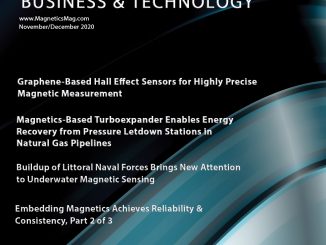A Column by Dr. Stan Trout | Spontaneous Materials
First, let me say that Magnetics 2015 in Orlando was a wonderful and productive experience. It is always a pleasure to see so many old friends and to meet a few new ones. The latest group to complete the Magnetics Bootcamp is pictured below. We were all smiling at the end of the day, no doubt anticipating a visit to the bar downstairs.

When the Magnetics Bootcamps were first conceived in 2007, it was unclear how many people would ultimately want to attend such a seminar, but every year it is offered it seems to draw a good group of participants. So as long as demand exists, it seems likely the bootcamps will continue.
The second day of the conference began with a most lively discussion, in my humble opinion, prompted by the joint presentations of Walt Benecki and Joanne Jia from HPMG Co., Ltd. They spoke about the patents for sintered NdFeB magnets. It would have been helpful to have someone from Hitachi to present their point of view, but that could not be arranged. Considering that there is ongoing litigation, it is easy to understand why they may not want to discuss the case in a public venue.
Joanne made a compelling case for Chinese magnet producers. Since China is the world’s primary source of rare earths and the home of more than 200 magnet plants, it is frustrating for the Chinese that only eight of their magnet producers are Hitachi licensees. To change this situation, seven Chinese magnet manufacturers have banded together to form “The Alliance,” which is trying to have four Hitachi patents invalidated. They are also offering a $15 million indemnification to any company who buys magnets from them and has a future legal problem with Hitachi. That seems like a very bold move to me.
Walt Benecki tried to imagine possible outcomes of this activity, from a clear legal win for either side, to some kind of split decision. No official poll was taken, but my guess is that most people in the room anticipate some kind of split decision. Regardless of the outcome, the lawyers will do well.
During the time for questions, I asked Joanne about the idea of trying to prevent future patents from being issued. She said they had not considered such an action. While it wasn’t the main topic of this session, an overriding concern is that patents globally are generally granted far too easily, with too many claims going unchallenged. This is happening universally, not just in our industry. At that point, I wasn’t even sure if there was a way to influence the patent office.
Returning home and spending a little time on the US Patent and Trademark Office website answered my question. It turns out that there is a program called Patent Examiner Technical Training Program (PETTP). This program brings in experts in all kinds of technology to give seminars to patent examiners. I’ve already registered and we are discussing a seminar in the next month or two, at the new patent office in Denver. I’ll report back on my experiences later. I will also try to see if patent offices in other parts of the world do the same thing. This may be a small way for some of us to influence our industry in the future.
 About the Author
About the Author
Dr. Stan Trout has more than 35 years’ experience in the permanent magnet and rare earth industries. Dr. Trout has a B.S. in Physics from Lafayette College and a Ph.D. in Metallurgy and Materials Science from the University of Pennsylvania. Stan is a contributing columnist for Magnetics Business & Technology magazine. Spontaneous Materials, his consultancy, provides practical solutions in magnetic materials, the rare earths, technical training and technical writing. He can be reached at strout@ieee.org.


